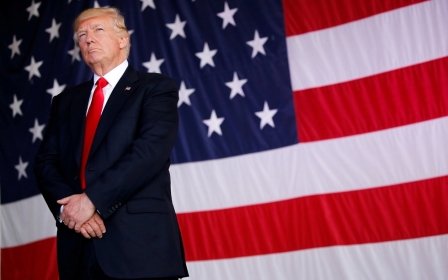Trump asks Supreme Court to reinstate Muslim travel ban
President Donald Trump's administration filed an emergency motion on Thursday asking the US Supreme Court to reinstate its temporary ban on travelers from six Muslim-majority nations, after repeated setbacks in the lower courts.
In its filing, the government asked the top US court to rule on the legal standing of Trump's order, appealing a ruling by the federal Fourth Circuit Court of Appeals that upheld a nationwide block of the travel ban.
It also asked the Supreme Court to lift another US-wide injunction issued by a federal judge in a separate case based in Hawaii. That case is currently before the Ninth Circuit Court of Appeals, where a decision is pending.
The administration is "confident that President Trump's executive order is well within his lawful authority to keep the nation safe and protect our communities from terrorism," Justice Department spokeswoman Sarah Isgur Flores said.
"The president is not required to admit people from countries that sponsor or shelter terrorism, until he determines that they can be properly vetted and do not pose a security risk to the United States."
The filing came one week after the Fourth Circuit Court of Appeals ruling dealt a fresh blow to Trump's efforts to push the controversial travel ban that has triggered mass protests and confusion at airports.
The Fourth Circuit said it "remained unconvinced" that the part of the measure naming the specific countries had "more to do with national security than it does with effectuating the president's promised Muslim ban."
'Lack of demonstrable urgency'
If the Supreme Court agreed to the administration's request, a 90-day ban on people entering the United States from Iran, Libya, Somalia, Sudan, Syria and Yemen would be immediately revived. The court could also put a 120-day ban on all refugees into effect and allow the administration to consider new vetting procedures.
Even if the court allowed the travel ban to take effect, the bigger constitutional questions of religious discrimination and presidential powers raised by the 6 March order would not be considered by the nine justices until long after the ban periods have ended.
The court begins its summer recess at the end of this month and will not give the case a full hearing until after its return in the fall, by which time the ban would have lapsed.
The challengers contest the administration’s claim that urgent action is needed for national security reasons. They point to the fact that the government did not previously ask the Supreme Court to intervene, even when lower courts denied earlier emergency applications seeking to lift the injunctions.
"This is different from the kind of case you would expect the Supreme Court to grant the extraordinary relief of a stay, because of the lack of any demonstrable urgency or harm and because the law and the facts are on our side," said American Civil Liberties Union lawyer Omar Jadwat.
Trump issued his initial travel ban by executive order in January, but that measure caused chaos at airports and was quickly halted by the courts, prompting the administration to issue a new executive order with a narrower scope.
A revised executive order was issued in March - meant to address concerns raised by the federal judges. It deleted Iraq from the list and removed an indefinite ban on Syrian refugees.
The order, however, was widely criticised by human rights activists and US states that are led by Democrats.
Federal judges in Maryland and Hawaii issued a nationwide block on the measure, sending the issue to the relevant appellate courts.
Given the case's high-profile nature, the full Fourth Circuit Court of Appeals in Virginia heard the arguments last week - bypassing the usual initial three-judge panel - for the first time in a quarter of a century.
Thirteen of the court's 15 active judges took part. Two recused themselves over potential conflicts of interest.
New MEE newsletter: Jerusalem Dispatch
Sign up to get the latest insights and analysis on Israel-Palestine, alongside Turkey Unpacked and other MEE newsletters
Middle East Eye delivers independent and unrivalled coverage and analysis of the Middle East, North Africa and beyond. To learn more about republishing this content and the associated fees, please fill out this form. More about MEE can be found here.




